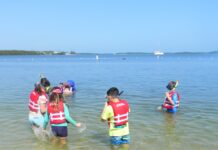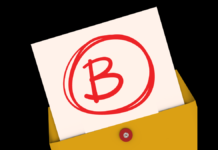I’m sure it irritates the current generation of school-age kids just as much as it used to bother me. No sooner are we past the Fourth of July then we start to hear those “Back to School” murmurings. I personally have not yet seen any ads, but I’ve heard my first few “save the dates,” and I know everything else is soon to follow.
It makes sense, then, to begin to talk about school-related stuff. Everybody, students and parents alike, is allowed a little anxiety around the coming school year. But let’s not forget there might be a few academically anxious parents (AAPs) of kids who might not even be looking at kindergarten for a few years. These AAPs might be wondering: At what age will I know whether or not my child is going to be a good student? And what should I be doing now to prepare him? While research is out there on these questions, there isn’t always agreement, and the answers aren’t always clear-cut. But let’s talk a little about what the specialists are saying.
We’re all familiar with that toddler who can sing, say, “MacArthur Park,” including the instrumental portion, perfectly and in its entirety. Does that translate to better school performance? One study in Britain looked down to age 22 months and found that good development then predicted success at age 10 years. Another study, this time on our side of the pond, found that reading at an earlier age predicted academic success during the grade school years. But before you start sending away for those grad school applications for your early reader, note a curiosity in the study: early reading was associated with less overall educational achievement.
Clearly, the messages are mixed, and you may not be able to predict how she will do. But there are some things you can do early on to increase her chances of success:
· Read to your child from an early age. Even in infancy, children can get used to the rhythm of speech, the turning of pages (assuming you have the old-fashioned, paper-type books), and associating pictures with words. Make it fun by letting her choose the book.
· Make sure you and your child play together! Choose some age-appropriate games that involve physical activity.
· Realize that those periodic doctor visits are not just “for the shots.” Your pediatrician will screen your child for problems with development. If any are found, it’s important to follow through with any referrals.
· Although you don’t need to enroll your child in an Ivy League nursery school, an appropriate preschool will help stimulate learning and development. If it’s not affordable, look to see if your child qualifies for Head Start.
We haven’t really answered the question of who will do well. But a lot of the activities that will prepare kids to take their best shot at school are things that are, well, fun to do for parents and kids alike. Include lots of them in your routines, and the seemingly more relaxed pace of summer is a great time to start. And remember: if that TV is off because the two of you are doing other things, that’s less back-to-school ads!
One good resource for more information: the Early Learning Coalition. Reach them at 786-433-3095.


























